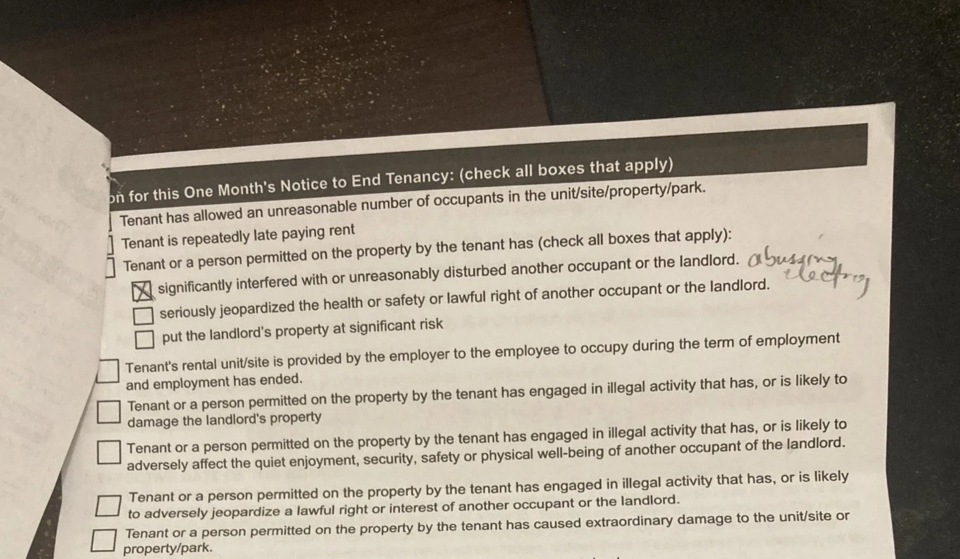A Metro Vancouver renter may be forced to end their tenancy for seeking respite from the that descended on B.C. last weekend.
Cole L. (last name omitted for privacy) is a renter in North Surrey who last week posted a photo of a month’s notice to end tenancy served to them by their landlord. The letter seems to be the culmination of an ongoing dispute between Cole and their landlord relating to utility usage over the past few weeks. The reason for the notice? That Cole had allegedly “significantly interfered with or unreasonably disturbed another occupant or the landlord.” Next to this option on the notice of eviction the landlord wrote in brackets “abussing [sic] electricity.”
It started earlier this month when Cole, who pays $700/month for their accommodation, purchased an air conditioning unit to prepare for the heat wave. Not long after Cole from their landlord telling them to remove the air conditioner within 24 hours. The letter came despite Cole offering to pay for the increase in utilities the air conditioner would bring.
'No one put any air conditioner/fan in the suite except you'
Cole then says they spoke to a Residential Tenancy Board (RTB) information officer to make sure they would be allowed to use the unit. Cole says the RTB told them the letter from the landlord was unenforceable.
Later, Cole placed a fan in the living room for their roommate. Soon after that, Cole got the eviction notice.
The landlord wrote in the notice that the fan in the living room seemed to be “running on all day and night.” The notice again cites utility costs as the reason for eviction.
“You complained about heat wave but I've been renting my place for many years and no one put any air conditioner/fan in the suite except you,” the landlord writes. “The suite is facing the east side of the house so it's cooler during daytime. Also this is not included to our agreement to have air conditioning in the suite [sic].”
'Comically dishonest'
Cole disputes many of the letter’s claims calling the notion that no one has ever run a fan in the units “comically dishonest.” Cole also takes issue with the idea the part of the building they live in is naturally cooler.
“The south side, which is blocked by the shadow of the house next to us, receives the most light. The west and east sides both receive the same,” Cole wrote to Vancouver Is Awesome. “Both relevant sides of the house get equally hot.”
Cole says this situation is indicative of what many Metro Vancouver renters are facing.
“It really reiterated the social inequity landlords are complicit in perpetrating,” Cole said. “Not only are we expected to subsidize their income/mortgages etc., But under the smallest threat of a slight loss in profit, they would rather have their tenants suffer in a heat wave.”
'A disproportionate rise in renters'
Cole noted the rise in housing prices could lead to a disproportionate rise in renters compared to the population, increased class inequality, and increased infringements on the rights of tenants by their landlords.
Since receiving the notice, Cole has filed a dispute resolution.
The Attorney General and Ministry responsible for Housing described to V.I.A. what would happen next for Cole. Generally speaking, once a tenant has disputed a notice of eviction, the burden is on the landlord to establish they have valid grounds to end the tenancy based on the tenant’s actions.
“The arbitrator would make a decision on the case, and would have to consider the context of the case in its entirety to determine what is reasonable,” the statement reads. “Disagreements between landlords and tenants can often relate to utility use. We encourage landlords and tenants to make clear what services and utilities are included as part of the rent in their tenancy agreement by putting it in writing.”

